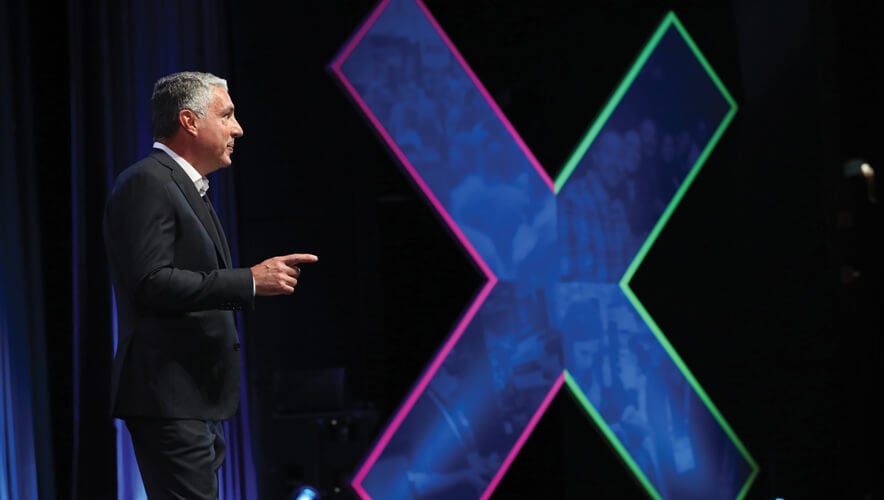Jacobs CEO Steve Demetriou on the Cruciality of Culture
Like many change-agent executives, Steve Demetriou had a clear-cut mission when he took over as chair and CEO of Jacobs a few years ago: transform the organization.
And so, “we laid out a transformational strategy,” Demetriou told GSX 2019 attendees during his keynote speech. “We had to challenge everything—ourselves, our structure, our culture, and our mindset.”
Given that Jacobs is no small firm, but rather a multinational corporation with more than 50,000 worldwide employees generating $15 billion in annual revenue, this transformation required a wide variety of targeted actions.
Company leaders refined operations and processes to be more consistent and accountable. They changed the firm’s investment plan to support more innovative projects, and they moved toward a more global business structure to stimulate growth and empower more employees, Demetriou explained. To protect all these developments, the leaders expanded the organization’s enterprise risk management capabilities.
But of all the initiatives, one stood out. “Most importantly, we place a relentless focus on culture,” Demetriou said.
To help guide cultural change and create a sense of purpose, the company documented its vision, mission, and values, and emphasized specific aspects of the culture, such as inclusion, safety, and wellness.
For Jacobs, the concept of inclusion is based on the idea that all employees are listened to, and they understand how their work makes a difference. “In business, we talk a lot about diversity. But for us, it starts with inclusion,” Demetriou said. “That means 100 percent of our 50,000 employees are included in—and have a voice in—the challenges we are solving. They understand how they support the solutions we deliver.”
Inclusion also encourages innovation, because it builds a workforce that contains a wide range of perspectives and different schools of thought. “If we want to solve a client’s most difficult problem, we have to foster a culture that actively solicits new ideas and approaches from all of our people,” Demetriou explained.
And although inclusion goes beyond diversity, diversity is also still key—especially in upper management. “My executive leadership team is now 80 percent diverse with females and people of color,” Demetriou said. Diversity among Jacobs’ board of directors, while not as advanced, is still making progress, he added; with two recently added female board members, the board’s diversity now stands at 45 percent.
In the same way that inclusion extends beyond diversity, the company believes that safety means more than just striving for incident-free workplaces. The company’s safety program is called BeyondZero; it aims for zero accidents in the workplace, but that is only one aspect of a more ambitious agenda. “We took our safety mindset and expanded it to an entire culture of caring. Our people go beyond following the rules. They care for one another, in our offices, on project sites, at home, while traveling,” Demetriou said.
And every manager at Jacobs is taught that employee wellness is crucial to success. “We believe this part of our culture drives healthy behavior, on and off the job, making our people, their families, and their communities safer—because when you have genuine concern for each other, it makes it impossible to tolerate unsafe conditions or behaviors,” he said.
Another vital component of a safe and productive workforce is positive mental health. Mental illness is one of the biggest epidemics companies around the world face, Demetriou said; he cited one study that found one in every four employees, on average, suffers from some sort of mental health issue. “It could be severe depression, it could be anxiety, sleeplessness, whatever it is,” he explained in an interview with Security Management following his address.
To combat this, Jacobs first established about 400 “mental health champions” within the company around the world, to assist and counsel those who want help.
“They’re trained within the company. It’s not only to have a person to talk to, it’s also helping to build awareness and build solutions—how do we treat this like any other health issue and get people comfortable with the idea that mental health is not a weakness, it’s not a stigma. It’s like any other illness,” he said.
Since the first 400 mental health champions were appointed, there has been a “groundswell” of positive response to the initiative, so that the number of champions now exceeds 1,100. “It’s been amazing,” Demetriou said.
Read more GSX keynote coverage here:
Q&A: John Kelly on China, Partnerships, and Border Security
What Poker Taught One Expert About Cybersecurity
Bremmer Talks Geopolitics and Strategy at GSX 2019
